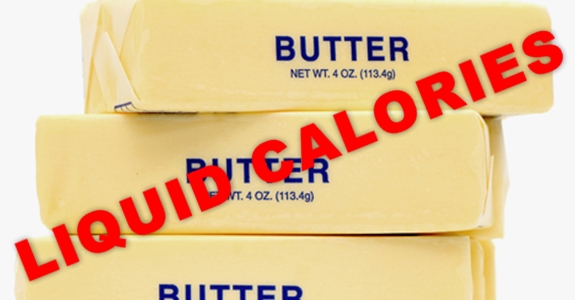22
Feb
Bad science, butter coffee, and liquid calories
Sharing my thoughts after reading yet another article recommending adding butter to your coffee that reeks of bad science…
BAD SCIENCE EXAMPLE #1:
The first link within the article leads readers to a website that promotes the butter-coffee product being pushed to followers . This makes the article a credible source of UNbiased data…right? The info-graphic within the article should have had “SALES” written across it. The author goes so far as to use “less heart disease in 1910” as a way to link more butter consumption to improved cardiovascular health. Again I ask, good science? Or perhaps in 1910 North Americans had significantly less access to calorie-dense food supplies while expending far more daily calories. Yet it had to be the butter…right?
BAD SCIENCE EXAMPLE #2:
Link 2 used as “evidence” in this pro butter-coffee article brings you to a blog written by a student from Iceland….again not a systematic review or randomized trial. The hyperlinked blog is an opinion piece with strong language suggesting bias. Good scientists rarely and almost never use absolute terms. Science is about discussion, those who refuse to participate in healthy debate are in what some experts call “parallel science” as their path never crosses mainstream research. Author popularity often does not correlate with expert opinion. This is why it is important to critically appraise what you read…
One comment in this student’s blog: This study “examined the effects of Vitamin K2 on heart disease, those who had the highest intake had a 57% lower risk of dying from heart disease”. (Desperately trying to link butter vitamin K2 levels to preventing heart disease) I read the study. What did they fail to mention in their blog? THIS IS A RELATIVE RISK REDUCTION, NOT ABSOLUTE.
Why does this matter?
Number of people consuming higher levels of vitamin K2 who died of CHD? 23/1624 = 1.4%
Number of people consuming lower levels of Vitamin k2 who died of CHD? 41/1578 = 2.6%
What was the ABSOLUTE CHANGE? Only 1.2%. Furthermore, this data came from a SINGLE study with WEAK controls at best. Did they randomize participants into one group receiving a high dose vitamin K2 diet comparing them to another randomized group consuming a low dose vitamin K2 diet? They did not. I agree that at a population level, well controlled studies have shown 1.2% changes to be significant and retrospective observational studies can provide insightful data. However, in this situation it is difficult to make strong claims based on a poorly controlled study in which butter is not discussed. Pooled results in the form of systematic reviews with meta-analysis that combine data from multiple observational studies are preferred.
The foods mentioned in this study that may” be beneficial for reducing cardiovascular disease include: Curds and low-fat cheese. Notice the appropriate language from researchers: “may”. Nowhere in this entire study do the researchers mention butter specifically, let alone grass-fed butter. Yet promoters of butter-coffee have included this study to back up their claims. Again I ask, good science or a biased sales pitch?
WHAT SCIENCE SAYS
In this case, the truth was in the literature. Unfortunately, even guys that blog about being experts can manipulate scientific data to make it sound more sensationalistic for readers. An absolute change of 1.2% from one study is NOT a reason to start prescribing butter in coffee. I am sure there is other scant data to support it, but again, no major reviews specifically talking about recommending butter in coffee, or single nutrients like vitamin K2 (variable K2 levels in butter depending on the source). Yes, we know saturated fat may not be as bad for us as previously thought, yet even here, one must be careful about using strong, sensationalist language. Few things in science are absolute, especially when it comes to nutrition data that seems to change with the weather…
DANGERS OF SOCIAL HYPE AND FAD DIETS
The real danger here is found in the thousands of vulnerable readers unquestionably following this blogger and other popular fitness and health personalities who promote biased claims (often promoting their sponsor). We must be critical of ourselves when promoting products of any kind, especially ones backed by questionable science. Excess calories, through a plethora of health consequences, kill thousands of Canadians annually. From a preventive medicine perspective, it is irresponsible to recommend adding butter to coffee, increasing liquid calories that are often the crutch of sustainable weight-loss.
What about those not gaining weight and sometimes losing weight drinking butter? Elite athletes and serious exercisers can often “out-exercise nutrition” focused on butter-coffee as a result of significantly higher daily caloric expenditures. One may question the sustainability of this approach to weight-loss. The other 95% of the population has no use for empty liquid-butter calories, with levels of vitamins that are surpassed by those found in whole foods.


Recent Comments